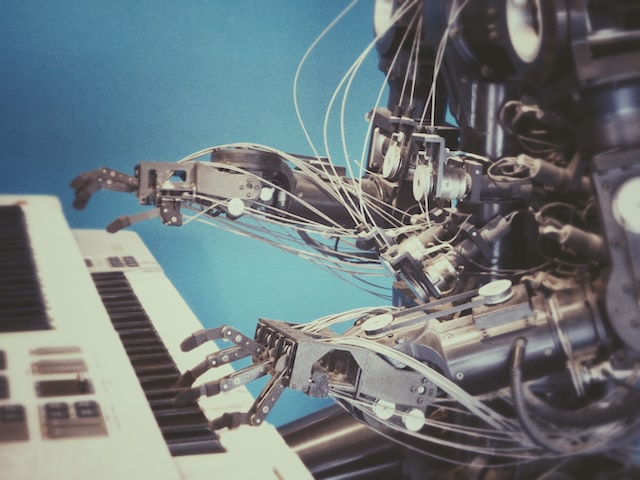Unlocking the Mysteries of AI: Discover Its Power and Potential
Artificial Intelligence (AI) is a rapidly developing field that has the potential to revolutionize the way we live and work. AI refers to the creation of machines that can perform tasks that typically require human intelligence, such as learning, problem-solving, and pattern recognition. In this article, we will explore what AI is, the history of AI, and the importance of AI in today’s world.

Definition of AI
Artificial Intelligence is a branch of computer science that deals with the development of algorithms and systems that can perform tasks that typically require human intelligence. AI systems can be designed to learn from data, make decisions, and perform tasks without explicit human intervention.
History of AI
The concept of artificial intelligence has been around for centuries, with roots in Greek mythology and the development of machines that could perform simple tasks. However, the modern field of AI can be traced back to the mid-20th century, when researchers began exploring the possibility of creating machines that could mimic human intelligence. Over the years, AI has evolved significantly, with advancements in machine learning, natural language processing, and computer vision.
Importance of AI in Today’s World
Artificial Intelligence is becoming increasingly important in today’s world, as it is being integrated into various industries and sectors. AI is being used to automate mundane tasks, improve efficiency, and make data-driven decisions. In healthcare, AI is being used to diagnose diseases, develop personalized treatment plans, and improve patient outcomes. In finance, AI is being used to analyze market trends, detect fraudulent activity, and make investment decisions. The potential applications of AI are vast and far-reaching, making it an essential field for continued research and development.
Closer Look of Artificial Intelligence
Types of AI
There are four main categories of AI, which include reactive, limited memory, theory of mind, and self-aware. Each type of AI is unique and offers its own set of benefits and limitations.
- Reactive Machines: These are the simplest forms of AI, designed to react to specific stimuli in the environment. Reactive machines do not have the ability to store information or use previous experiences to inform future decisions. Examples of reactive machines include Deep Blue, the chess-playing computer developed by IBM.
- Limited Memory: These are more advanced forms of AI, designed to store information about their environment and use this information to inform future decisions. Limited memory AI systems can be trained on data to improve their accuracy over time. Examples of limited memory AI systems include self-driving cars and facial recognition systems.
- Theory of Mind: This type of AI is designed to understand the thoughts and beliefs of other individuals and entities. Theory of mind AI systems are still in the early stages of development, but they have the potential to revolutionize fields such as psychology and sociology.
- Self-Aware: This is the most advanced form of AI, designed to be aware of its own existence and consciousness. Self-aware AI systems are still purely theoretical, but they have the potential to change our understanding of what it means to be alive and conscious.
Key components of AI systems
The key components of AI systems include:
- Machine learning algorithms: These algorithms allow AI systems to learn from data and improve their accuracy over time.
- Natural language processing: This component allows AI systems to understand and interpret human language, which is critical for tasks such as customer service and sentiment analysis.
- Computer vision: This component allows AI systems to process and interpret visual information, which is critical for tasks such as object recognition and image classification.
- Robotics: Robotics integrates AI with physical machines, allowing AI systems to interact with the physical world.
We will go over these components in detail in the following section – Advancements in Artificial Intelligence.
Applications of Artificial Intelligence
Artificial Intelligence (AI) is rapidly transforming various industries, offering new and innovative solutions to various challenges faced by organizations. Here are some of the prominent industries where AI is making a significant impact.
Healthcare
AI has the potential to revolutionize the healthcare industry by automating mundane tasks, enabling earlier diagnosis, and improving patient outcomes. AI-powered systems can analyze medical images, process medical records, and identify potential health issues. With the help of machine learning algorithms, AI systems can learn from past data and provide more accurate results. This can lead to better treatment options and improved patient outcomes.
Finance
The finance industry is another sector that is greatly impacted by AI. AI-powered systems are used to automate various processes such as fraud detection, credit scoring, and investment management. AI algorithms can also analyze vast amounts of data and make predictions about market trends and stock performance. This can help financial institutions make better investment decisions and minimize the risk of fraud.
Retail
AI is changing the retail industry by providing personalized recommendations, improving supply chain management, and automating various tasks. AI algorithms can analyze customer behavior, preferences, and purchase history, leading to improved recommendations. This can drive sales and customer loyalty. AI can also be used in supply chain management to optimize inventory levels, reduce waste, and improve delivery times.
Manufacturing
AI has the potential to significantly improve the manufacturing industry. AI algorithms can be used to optimize production processes, reduce waste, and improve quality control. By analyzing production data, AI systems can identify areas where improvements can be made, leading to a more efficient and effective production process.
Customer Service

AI is also transforming the customer service industry by automating routine tasks and improving customer experience. AI-powered chatbots can handle customer queries, freeing up human agents to focus on more complex tasks. AI algorithms can also analyze customer feedback, enabling organizations to identify areas where they can improve their services. This can lead to improved customer satisfaction and a better overall customer experience.
Graphic Design
In the field of graphic design, Artificial Intelligence (AI) is being used to streamline and automate many tasks. From simple tasks such as resizing and cropping images, to more complex tasks such as color correction, object recognition, and stylization, AI is providing graphic designers with new and efficient ways to produce high-quality designs. By using AI algorithms, graphic designers can now process and manipulate large amounts of data and images much faster than before, freeing up time for more creative and strategic work.
Advancements in Artificial Intelligence
Artificial Intelligence (AI) has come a long way since its inception and with each passing day, researchers and developers are making advancements that allow machines to learn and perform tasks with increasing precision and efficiency. In this section, we’ll take a closer look at some of the most important advancements in the field of AI.
Machine learning
Machine learning is the process of training machines to automatically learn patterns and relationships from data. This is a crucial component of AI, as it enables machines to learn from data and perform tasks without explicit instructions. Machine learning algorithms can be supervised, unsupervised or semi-supervised, and they are used in a wide range of applications such as speech recognition, image classification and natural language processing.
Natural language processing
Natural language processing (NLP) is a field of AI that deals with the interaction between computers and humans in natural language. NLP enables machines to understand and process human language, and it has applications in areas such as speech recognition, language translation and sentiment analysis. With advances in NLP, machines are now able to understand and respond to human speech in a more natural and intuitive manner.
Computer vision
Computer vision is a field of AI that deals with the analysis and interpretation of visual information. This includes tasks such as object recognition, image classification, and facial recognition. With advancements in computer vision, machines are now able to perform these tasks with increasing accuracy, which has applications in areas such as self-driving cars, security and surveillance.
Robotics
Robotics is a field of AI that deals with the design and development of robots. Robots have traditionally been used in manufacturing and assembly line operations, but with advancements in AI, robots are now being used in a wider range of applications such as healthcare, education, and customer service. With AI, robots are now able to learn from their surroundings, make decisions, and perform tasks in a more autonomous manner, leading to increased efficiency and productivity.
Ethical Concerns with Artificial Intelligence
AI continues to integrate into our daily lives, it’s important to consider the ethical implications and potential consequences. In this section, we will delve into the various ethical concerns surrounding AI. Understanding these concerns is important in ensuring the responsible and ethical development and use of AI technology.
Privacy
AI relies on vast amounts of data to operate effectively, but there is a risk that this data could be misused or mishandled. This could result in sensitive personal information being disclosed or used for unethical purposes. It is crucial to ensure that proper measures are in place to protect the privacy of individuals and their data.
Bias
AI systems are designed and trained by humans, and therefore, they may perpetuate human biases. This could result in unfair and unequal treatment of individuals and communities. It is important to ensure that AI systems are designed and trained with diversity, transparency, and fairness in mind.
Job Displacement
AI has the potential to automate many jobs, leading to job displacement for workers. While this could free up workers to take on more creative or higher-level tasks, it could also result in widespread unemployment and social unrest. Governments, companies, and organizations must work together to find ways to mitigate the negative effects of AI-driven job displacement.
Autonomous Weapons
AI has the potential to be used in the development of autonomous weapons, which could operate without human intervention. This raises the question of accountability in the event of harm caused by these weapons. There is a need for international agreements to prevent the development and use of autonomous weapons and ensure that AI is used for peaceful purposes.
Future of Artificial Intelligence
Predictions for AI’s impact on society
The future of AI is a topic of much speculation and debate. On one hand, some experts predict that AI will bring about a utopia where machines do all the work and humans live lives of leisure. On the other hand, there are those who predict a dystopian future where AI becomes too powerful and replaces human workers, leading to widespread unemployment and social unrest.
Regardless of the predictions, one thing is certain – the impact of AI on society will be significant.
Advancements in AI research
Researchers are working on developing AI systems that can think and reason like humans, as well as those that can perform tasks that are currently beyond human capabilities. In addition, there is a growing focus on creating AI systems that are more transparent and accountable, so that their decision-making processes can be easily understood and audited.
The potential for AI to solve global problems
One of the most exciting aspects of AI is its potential to solve some of the world’s biggest problems. For example, AI could be used to develop solutions for climate change, global poverty, and disease outbreaks. By leveraging its ability to process large amounts of data and find patterns that humans might miss, AI has the potential to revolutionize the way we approach these problems and find new solutions that were previously beyond our reach.
Summary and Conclusion
Artificial Intelligence has become a crucial aspect of our daily lives. From healthcare to finance, retail to manufacturing, and even customer service, AI has made its presence known in many industries. Its advancements in machine learning, natural language processing, computer vision, and robotics have opened up new avenues for its applications.
However, with the growth of AI also comes ethical concerns such as privacy, bias, job displacement, and autonomous weapons. It is essential to address these concerns and find solutions to mitigate their impact.
The future of AI is both exciting and unpredictable. Predictions suggest that AI will have a significant impact on society and continue to advance with new research. The potential for AI to solve global problems is immense, but it will require careful consideration and responsible implementation.
Understanding AI and its advancements, applications, and ethical concerns is crucial for shaping its future. The benefits of AI are vast, but it is essential to balance them with the potential drawbacks to ensure that AI is used for the greater good.
Free Artificial Intelligence Books
If you want to know more about Artificial Intelligence, check out the free Artificial EBooks below.

Comments (0)